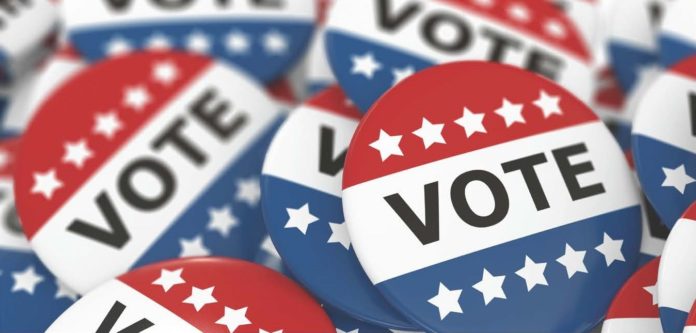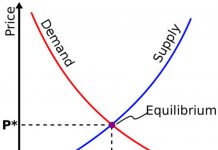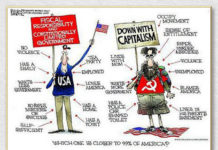An interesting question was posed to me recently: “How does our economy work for everyone, not just the rich?” While they COULD have asked a bigger, more open-ended question, I think I can shed a bit of light on this one. Let’s dig.
In a Capitalist society, individuals WORK. Whether that is manual, physical, planning, research, teaching, selling, or any number of activities, that effort earns an agreed upon amount of funds for doing so. Those funds can be paid via hourly, salary, by commission, or by task completed. Usually, but not always, the rarer your skill set is, coupled by how in demand that skill is, determines the amount of pay received. If some random person off the street can do a job well with little or no instruction, odds are, that job will not have a high pay rate. The economic laws of Supply and Demand are inflexible and fully describe this dynamic. High Supply of those with a given skill, along with a moderate or low Demand for that skill, low Prices (wages) paid. Similarly, people with rare skills, that either take years of education, years of practice, or simply do things others cannot do, if those skills are in high Demand, the Price paid is much higher.
The classic query: why does a pro athlete get paid more than a teacher? Because the athlete does something only a few humans (usually just a few hundred worldwide) can do; and that skill has an entertainment and advertising Demand; while teachers do a valuable service, there are literally THOUSANDS that can do it. There are THOUSANDS of people trying all they can to achieve pro-level performance, yet they never quite get there. Most folks that want to be teachers, after satisfying educational requirements, are hired.
Another issue: artists. Why do artistic endeavors not pay more? Well, if there is a market for your brand of ‘art’, it can pay quite well (ask The Eagles). But if that ‘art’ does not rise to a level of quality (quite subjective) to meet a market, the price demanded is quite low, possibly zero.
There are exceptions to this rule: those in government, for example, get paid a flat fee, regardless of their performance. Government established or blessed monopolies can break those Supply and Demand curves. Think DMV—regardless of how well or poor that service is provided, the pay is the same, and poor performers keep their jobs—because there is no competition for that task. But I’ll limit this discussion on free market dynamics, with alternative options available.
Now, pick an industry, and those Supply and Demand curves show themselves. Even universal needs in our country (food supply, water treatment, power grid supply and maintenance, etc.) adhere to those curves. If the price of a given food is too high, consumers may pick an alternative food, thus decreasing the Demand for the first food. Note that the price of food includes many sub-markets: seeds, fertilizer, weed control, harvesting, storage, shipment, final sales. If the wages to any step of those sub-markets become high, more people enter (or attempt to enter) that job market, putting downward pressure on the wages for that job. To call it complicated is a vast understatement, regardless of what you may value each step in the process.
Pick a common good: cell phones and services. Each cell phone sold contributes to all of the many processes necessary to create, advertise, service, and sell that phone. From mining for minerals and metals, to the laboratory work necessary to create the functioning parts, to the assembly, to the TV commercials that drive consumer demand, to the cellular network the phone operates upon—even the cost to produce phones that no one wanted to buy–all steps factor into the final price, including the impact of the MANY companies that compete producing phones. And each step of the way, a wage is paid to get that particular function accomplished.
And some companies enter that market, and for whatever reason, do not sell as much or as many as they intended, and they fail. They go out of business. The examples of business failures are greater than successes, but most foks are simply not aware of most of the companies that fail. Consumers buy (or not) of their own volition, and for whatever reason they want. Buying, except under very rare circumstances, is optional, not compelled. And the greater the competition for that purchasing dollar, the more options consumers have.
An important point here: Big XXX, whatever industry, can only succeed by creating products that consumers WANT, at a price they want to PAY, at a cost of production small enough to create a PROFIT. Big XXX simply cannot stay in business any other way. So, the ‘rich’ become ‘rich’ and stay ‘rich’ by adhering to this simple formula. The earlier mentioned monopolies are exceptions to this rule.
Now think of all of the goods and services produced in the US yearly—the latest number is around $19T per year in economic activity!
So, why are there still poor? Why does this system not work for everyone? The simple answer: some never acquire the knowledge, skill, effort, drive, and consistency to be useful employees, or to produce a product or service people want to buy. Their combination of traits do not satisfy a need of anyone hiring near them, and they may lack the resources to relocate to where jobs may be more plentiful. There may even be jobs available near them that WOULD hire them, but the potential employee doesn’t know where those jobs are, or how to find them. The potential employer may not advertise his need in a place the potential employee knows to look.
Another potential problem is our social safety net. People can get paid, and have purchasing power, without working, via Welfare. This is a true disincentive to ‘work’, as basic needs may be met without effort. This happens no where else in nature. Prior to our Welfare State, people that did nothing earned nothing, and survived only via charities—until they exhausted those avenues.
Another factor that cannot be overstated: our poor educational system.
Many folks either drop out, or do not apply themselves to that system, so they become that ‘random person on the street’ with no marketable skill or the ability to learn one. Note that some folks overcome that poor education via hard work—but that is the exception, not the rule. Some folks actually do perform a service for a wage, but their money management skills are so poor, they can never rise above the minimum. These are referred to as the ‘working poor’. When you hear a politician refer to the ‘income gap’, he usually means the difference between ‘working poor’ and everyone else.
No system ever designed or implemented by man has ever eliminated the poor. However, with Capitalism, the poor can escape their status in life, usually via education, or learning on the job, to be a more valuable asset to the company they work for.
So, to summarize, our economy works for nearly everyone. They may have to relocate to where jobs are, or do things they do not want to do, short-term, to earn money until a better job opportunity comes along, but the system itself works, for those that want to work.
Note that the recent government shut-down of the economy in response to the COVID-19 pandemic is completely outside of the rules of Supply and Demand—the societal restrictions simply STOPPED the economy for many, many people.
Side note: not all that do not work are expected to do so. Handicapped (just don’t tell THEM that), the very young, the very old, etc. do not have an expectation of labor. Society has correctly chosen to assist those folks thru their lives. Also: for some, the non-work condition is quite temporary. We have some ‘unemployment insurance’ vehicles to get folks thru gaps in employment.
























